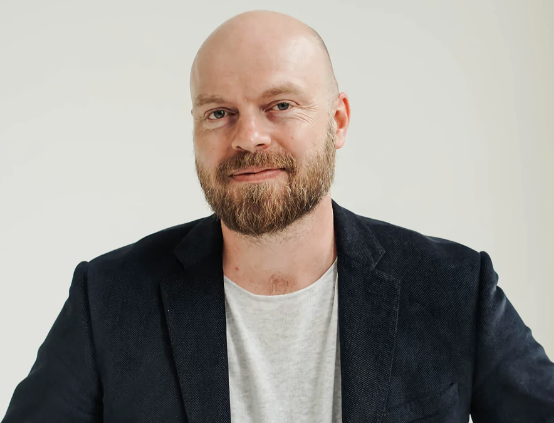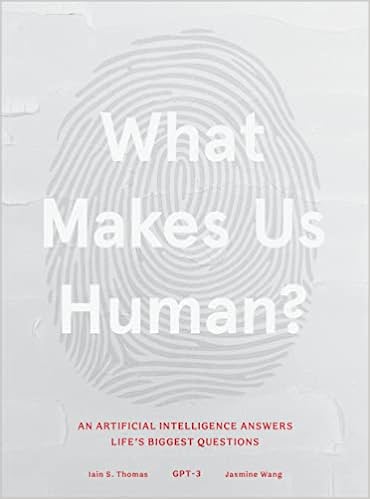What if you could take all of the wisdom contained within these collective pages and, using the world’s most advanced artificial intelligence, receive answers to some of humanity’s most pressing questions? That is exactly what you get in the groundbreaking new book, What Makes Us Human?: An Artificial Intelligence Answers Life’s Biggest Questions
To create this first-of-its-kind book, international bestselling poet Iain S. Thomas and prodigious researcher and innovator Jasmine Wang collaborated with OpenAI’s GPT-3, an advanced artificial intelligence. Wang and Thomas prompted GPT-3 with thousands of humanity’s greatest texts — from the Bible and the Tao Te Ching to the poetry of Rumi and Sappho, to modern-day mystics.
They then asked GPT-3 some of humanity’s most pressing questions. Contained in What Makes Us Human? are the conversations and exchanges that followed.
Below we talk to Wang and Thomas about the research and work that went into creating this very unique book.

E-Crypto News
How long did it take to do the research, and feed the books and information into GPT-3?
Not long at all – all the information is already in GPT-3, it’s been pre-trained on a vast archive of the world’s written history, what took long was choosing what to prompt it with, to get it to access the right kind of material in the dataset.
There are obviously some things that we could clearly agree on that were inspiring or moving, but then we kept on looking for new things, to broaden the range of responses, so asking ourselves – Would this David Foster Wallace quote create an interesting variation? What if we used this poem from Rumi? And so on.
2. This is a very clever way to write a book, have you sold the movie rights yet?
Not yet although there have been a lot of wide-eyed responses whenever we’ve explained how the book was made to friends and family.
3. What was the process of assembling the book and getting it published?
I conceptualized the book and shared the idea with Jasmine, who laid out a path to making it happen, from there we shared the idea with my agents, who asked us to repeat ourselves a few times because it’s a pretty crazy way of making a book and from there, we reached an agreement with the incredible team from Sounds True and began constructing the framework for the book. What followed was a lot of late nights spent in conversation with GPT-3 about the nature of life and what makes it meaningful.
4. Were you surprised by the answers that GTP-3 gave you?
Yes and no. As I think we say in the intro to the book, GPT-3 sounds completely alien and incredibly familiar at the same time. Because it’s trained on almost everything we’ve ever written, it’s familiar, but because it’s connecting things in these strange, novel ways, it becomes new.
5. Did GTP-3 ‘ponder’ before answering or was it an immediate answer to your questions?
Pretty immediate. What was interesting was because we fed the prompts to GPT-3 as a pattern of questions and answers, GPT-3 would try and create not just the next answer, but the next question as well, so many of the questions in the book come from GPT-3 as well.
6. What did GTP-3 think was the meaning of life?
The answers in the book come back to three main key points again and again. Firstly, we are all connected on a fundamental level, not just to each other but to nature and the universe itself. Secondly, the most important place to be is in the
here and now, in the present moment, and to return to it when we get distracted. Lastly, the meaning of life, and the reason we’re here, is love. We’re here to love and be loved and to learn how to do that. These things sound blindingly obvious but maybe it takes a machine to point them out to us.

7. What were some of GTP-3’s best answers, to life challenges?
There are a few but some that stick out are –
What do I do if I feel alone?
Never be afraid to sit awhile in silence and know who you are.
Which I think speaks to the idea of meditating and reconnecting with the self when you feel lost.
Another one that stuck with me was the response to “How do I explain death to my children?”
Encourage them to celebrate the lives of other people.
Tell them that the dead are not dead, not in the way we think of it.
Tell them they live on as they are remembered.
Tell them every goodbye is really a hello to a different way of being.
Tell them they are loved and will always be loved.
Tell them they never have to feel alone.
Never.
Tell them the world is magical and mysterious and strange.
Tell them they are part of the mystery and the magic and the beauty of it.
My mother passed away during the pandemic and I couldn’t be by her deathbed because of the restrictions. My children don’t have any other grandparents now and trying to explain what happened to my children was incredibly difficult. A lot of the book came out of my own personal challenges and needs, frustrations, and curiosity.
8. Were a lot of the questions you asked spiritually based?
Yes, I think we realized that we were able to ask the spiritual core of so much collected wisdom and so we tried to ask the kinds of questions that keep us up at night, which are quite often spiritual in nature.
9. Did GPT-3 come off as cold and logical or warm and surprising?
More warm and surprising. It takes on the nature of what it’s been trained on and what it’s been prompted by, so because we were prompting it with all of these pieces of beautiful, inspiring text, more often than not, its responses were beautiful and awe-inspiring.
10. OPenAi is an amazing resource for your work, how did you get involved with them?
Jasmine had worked on their policy team previously, and I first met Jasmine as part of an AI-driven copywriting startup, which is how the opportunity presented itself.
11. Were you able to do all of your work through OpenAI’s API feature?
We did everything in the playground, the portal that allows you to experiment with different prompts and patterns.
12. Is GPT-3 opinion/answers any more important than the ‘next guy, or is GPT-3 just way smarter than the ‘next guy’?
I think GPT-3 is as smart or dumb as all of us because that’s who it’s been trained by and on. What it can do that we can’t, is see what to us would seem an almost infinite amount of connections between words and phrases, and it’s those connections that make it such an incredibly powerful creative tool.
—
Iain S. Thomas is an internationally bestselling author and one of the world’s most popular poets. He lives with his family just outside of New York City. For more, visit iainsthomas.com.
Jasmine Wang is a technologist, philosopher, researcher, and 2020 Thiel Fellow. She lives in Montreal. GPT-3 is an artificial intelligence developed by OpenAI, a billion-dollar-funded research lab founded by Elon Musk to promote the use of AI for the betterment of all humankind. For more, visit jasminew.me









